
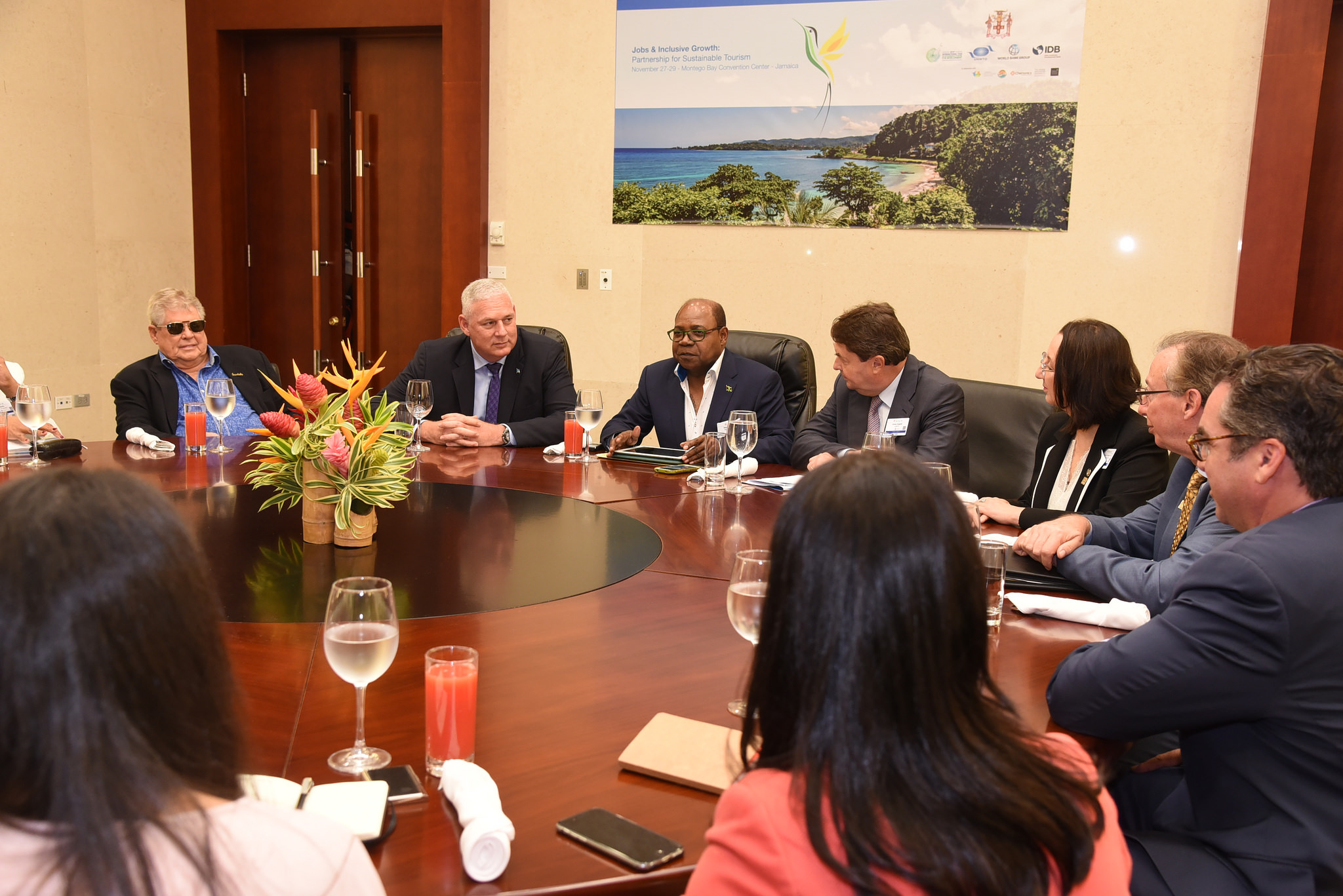
Minister Bartlett gives update on Caribbean Resilience Initiative
Acting in his capacity as Chairman of the Caribbean Tourism Recovery Group and UNWTO’s Disaster Recovery Working Group for the Affected States in the Caribbean, Minister of Tourism, Hon. Edmund Bartlett, continued discussions with key international and regional stakeholders about building resilience for the region in the event of natural disasters.
Sharing in the moment are, Prime Minister of St Lucia, the Most Hon. Allen Chastanet (left) and Executive Director of the UNWTO, Carlos Vogeler. The Minister used the opportunity to announce that a full draft of the recovery program would be ready at the end of the United Nations World Tourism Organization (UNWTO), Government of Jamaica, World Bank Group and Inter-American Development Bank Global Conference on Jobs and Inclusive Growth: Partnerships for Sustainable Tourism.
The announcement was made during the first day of the conference (Monday November 27, 2017), which is taking place at the Montego Bay Convention Centre.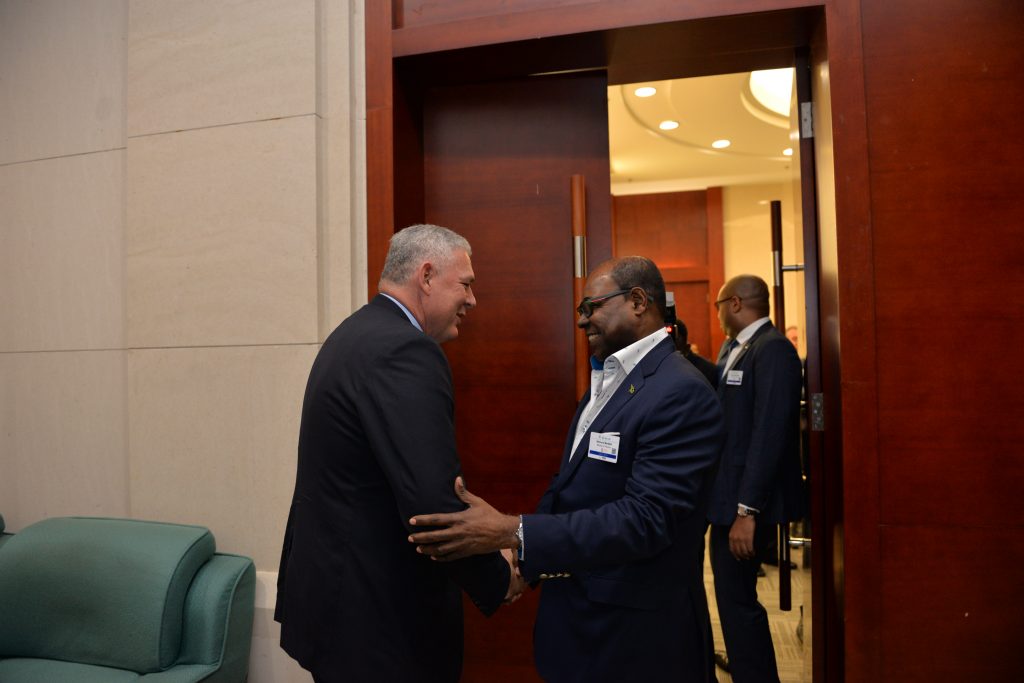
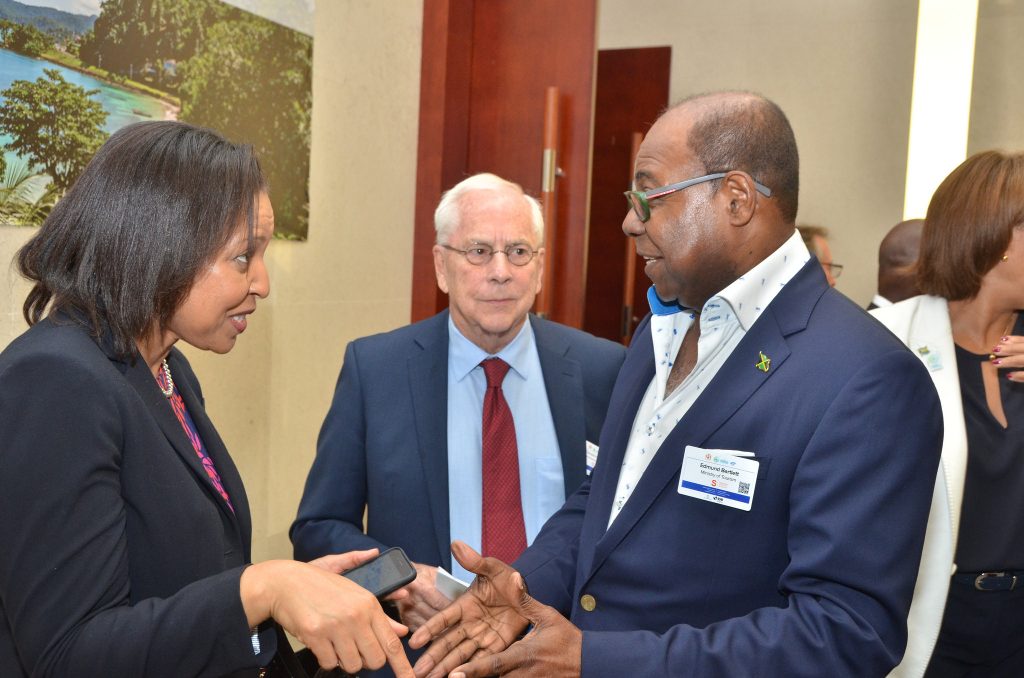
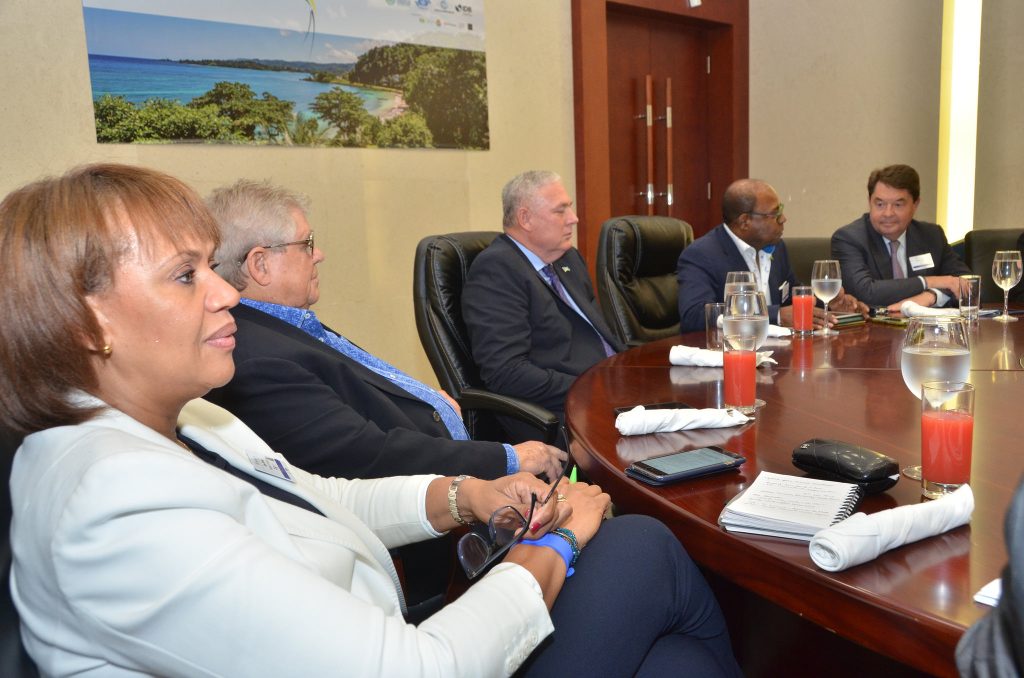

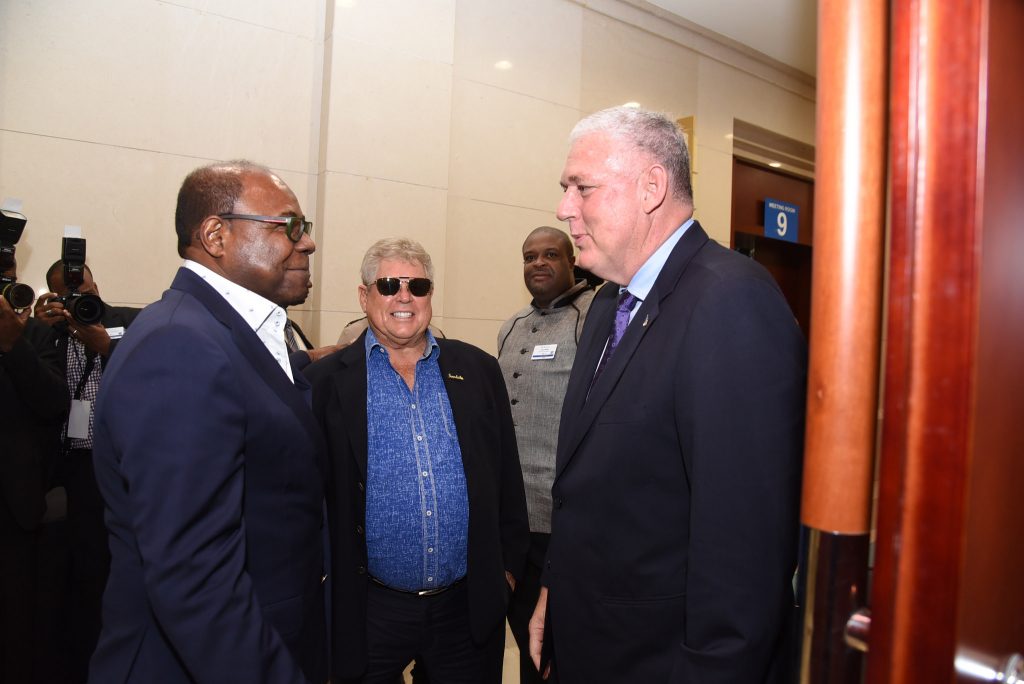
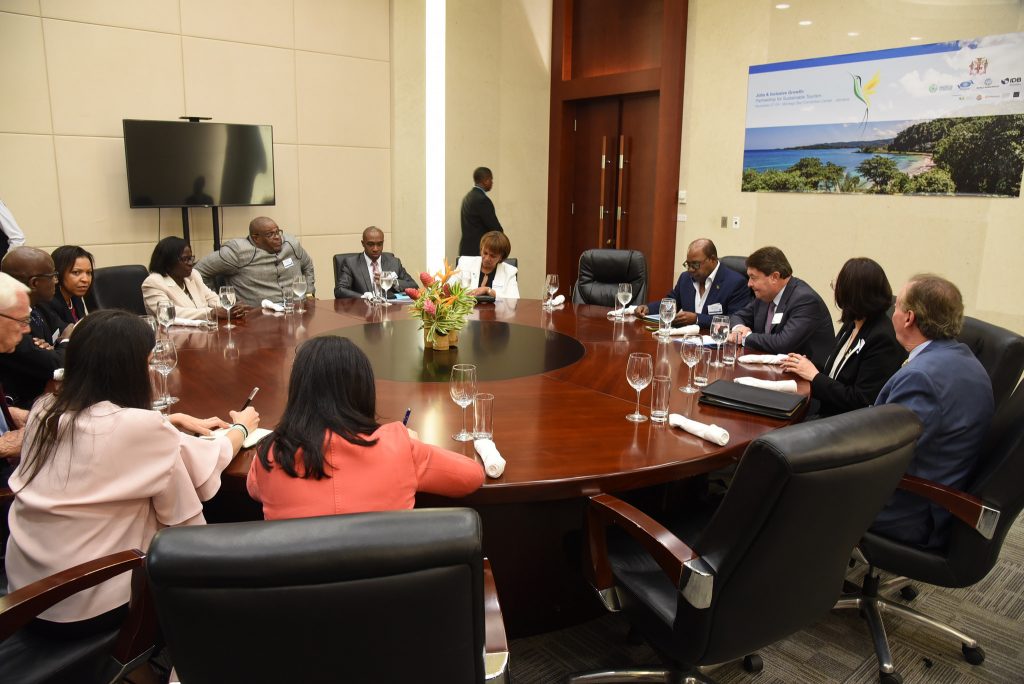
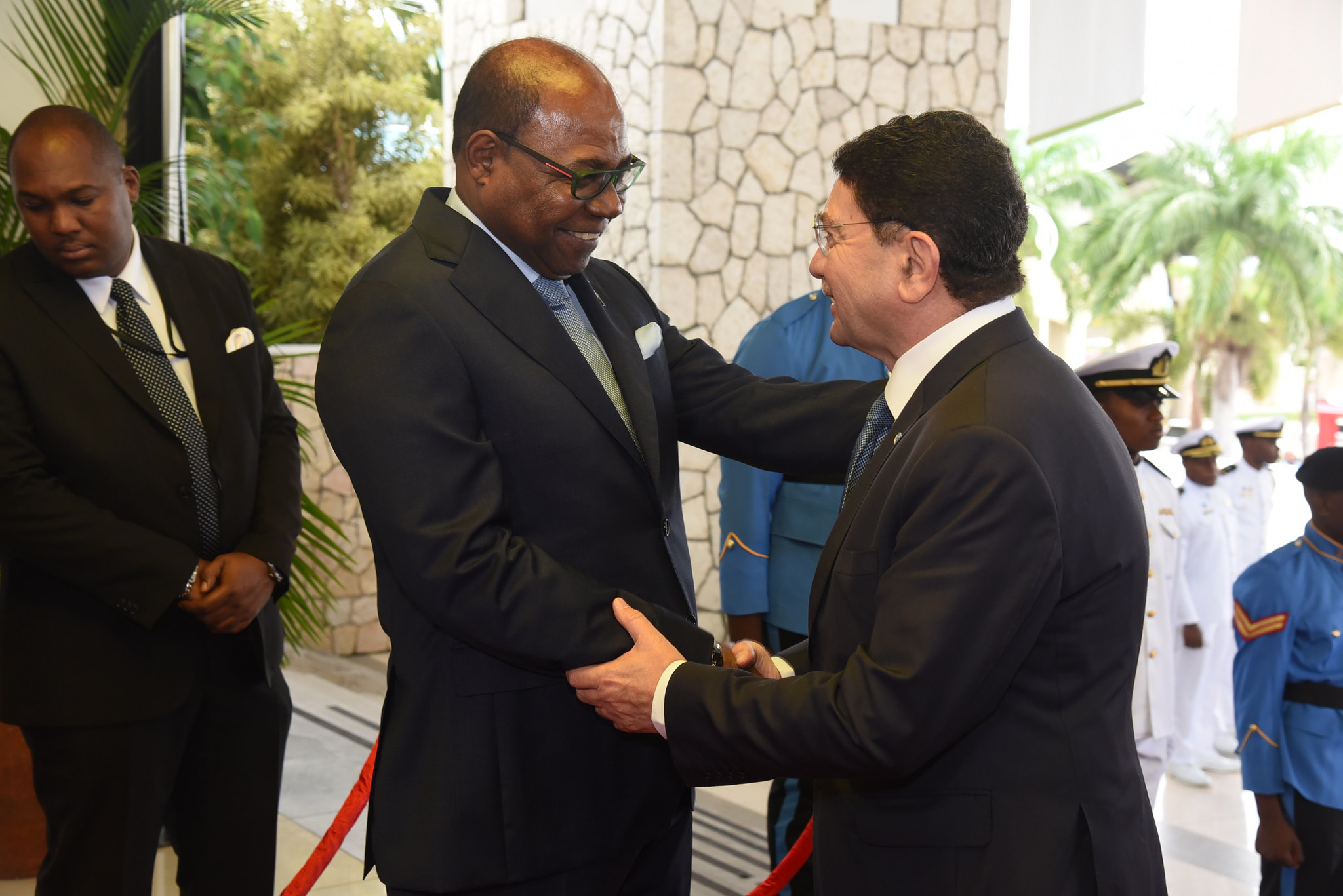
Tourism and the global sustainable development: Minister Bartlett’s remarks on Day 2 of UNWTO conference
Jamaica’s Tourism Minister Hon. Edmund Bartlett delivered the following remarks on Day 2 of UNWTO Global Conference:
• The quest to achieve sustainable development dominates the national policy agendas of most countries across the world. The United Nations in 2016 expanded its original global development mandate – the Millennium Development Goals – to give increased focus to a wide range of areas that are considered urgent to a successful global agenda for sustainable development.
• One hundred and ninety-three (193) World leaders adopted the 17 Sustainable Development Goals of the 2030 Agenda for Sustainable Development, indicating their commitment to mobilize efforts to eradicate poverty, fight inequalities and tackle climate change while ensuring that no one is left behind.
• Globally, tourism has been identified as one of the main catalysts for promoting sustainable development; so much so that the United Nations 70th General Assembly has designated 2017 as the International Year of Sustainable Tourism for Development.
• This designation provides a unique opportunity for tourism principals and policymakers to raise awareness of the contribution of tourism to sustainable development, while mobilizing all stakeholders to work together in making tourism a catalyst for positive change.
• In pursuing its mandate of aligning tourism with sustainable development, the United Nations and its network of global partners have committed to supporting a change in policies, business practices and consumer behaviour towards a more viable and inclusive tourism sector that can contribute to the attainment of the Universal 2030 Agenda for Sustainable Development and the Sustainable Development Goals (SDGs).
• This is particularly so in areas such as: promoting inclusive and sustainable economic growth, social inclusiveness, employment and poverty reduction, resource efficiency, environmental protection and climate change, cultural values, diversity and heritage and mutual understanding, peace and security.
Promoting SDGs
• Based on the United Nations conceptual framework, sustainable tourism strategies dominating the global agenda have been designed within the context of the broader discourse which seeks to position the global economic sectors and industries to maximize their potential to contribute to sustainable development.
• It has been, by now, widely accepted that global tourism has the potential to contribute, directly or indirectly to the achievement of Sustainable Development Goals such as:
o SDG 1 – Poverty eradication;
o SDG 3 – Promoting good health and well-being;
o SDG 5 – Promoting gender equality
o SDG 8 – P Promoting decent work and economic growth;
o SDG 7_ Promoting affordable and clean energy;
o SDG 9 – The development of industry, innovation and infrastructure
o SDG 10 – Reducing Inequalities
o SDG 11 – Promoting sustainable cities and communities; and
o SDG 12 – Promoting responsible consumption and production.
International Tourism in 2016
• The tourism sector continues to be a catalyst for economic growth and development among developing countries. The recently released WTTC Travel and Tourism Economic Impact 2017 Report found that despite facing increased threats related to global terrorism and political instability in many countries, Travel & Tourism continued to show its resilience in 2016, contributing direct GDP growth of 3.1% and supporting 6 million net additional jobs in the sector.
• In total, Travel & Tourism generated US$7.6 trillion (10.2% of global GDP) and 292 million jobs in 2016, equivalent to 1 in 10 jobs in the global economy. The sector accounted for 6.6% of total global exports and almost 30% of total global service exports.
• Growth in Travel & Tourism in 2016 outpaced that of the global economy (2.5%) for the 6th consecutive year. Additionally, in 2016, direct Travel & Tourism GDP growth not only outperformed the economy-wide growth recorded in 116 of the 185 countries covered by the annual economic impact research (including in major Travel & Tourism economies such as Australia, Canada, China, India, Mexico and South Africa) but it also was stronger than the growth recorded in the financial and business services, manufacturing, public services, retail and distribution and transport sectors.
International Tourism in 2017
• The data compiled for 2017 have so far revealed that international tourist arrivals worldwide grew by 6% between January to April when compared to the corresponding period last year, with business confidence reaching its highest levels in a decade. Destinations worldwide received 369 million international tourists (overnight visitors) in the first four months of the year, 21 million more than in the same months of 2016 (+6%), according to the latest UNWTO World Tourism Barometer.
• The data also indicate that many non-traditional countries are becoming more competitive and are controlling great shares of the global market. The top ten fastest growing tourist destinations this year are: Palestine, Egypt, Northern Mariana Islands, Iceland, Tunisia, Vietnam, Uruguay, Nicaragua and Mongolia and Israel.
• The impressive arrival figures for 2017 have been in-keeping with a consistent trend in international tourism growth. Indeed, the current volume, speed and reach of travel are unprecedented. International tourist arrivals increased from 25.3 million in 1950 to 1138 million in 2014 to 1184 million in 2015 to 1235 million in 2016. The projection is for that trend to continue throughout 2017.
Tourism and Sustained Economic Growth
• As one of the largest and fastest growing economic sectors in the world, tourism creates jobs, drives exports, and generates prosperity across the world. As such, tourism is well-positioned to foster sustained economic growth at all levels and provide direct and indirect incomes for billions around the world.
• Many developing countries have managed to expand their participation in the global economy through development of globally competitive tourism products. Indeed, tourism is the only export sector where the consumer travels to the exporting country, which provides opportunities for the poor to become exporters through the sale of goods and services to foreign tourists.
• Findings show that the development of the tourism industry in many developing and least developed countries (LDCs) has become the most viable and sustainable option for economic development, and in some countries, the main source of foreign exchange earnings. In 2014, Least Developed Countries (LDCs) received US$16.4 billion in exports from international tourism, up from US$2.6 billion in 2000, making the sector an important pillar of their economies (7% of total exports) and helping some to graduate from the LDC status. Tourism is also labour-intensive and supports a diverse and versatile labour market.
• The tourism industry is such a strong pillar of economic growth and development among Developing Countries mainly because of the economic linkages and diversification the sector promotes within host economies. The tourism value chain can incorporate many sectors in an economy.
• Its promotion will require the construction and operation of hotels, restaurants and other tourism-related facilities through backwards linkages and the development of basic infrastructure services, such as energy, telecommunications and environmental services; agriculture, manufacturing and other support services.
Tourism Supports Cross-Sectoral Growth
• Tourism can also create a wide range of forward linkages with sectors supplying services consumed by tourists. These include financial, telecommunications, retail, recreational, cultural, personal, hospitality, security and health services.
• In addition, countries wishing to strengthen their tourism sector will need to develop other tourism-supporting infrastructure, such as airports, proper roads, ports, hospitals and banks, which are essential for providing access to high-quality services and creating a competitive tourism destination.
• All of these tourism-related activities produce positive spill over effects in many Developing economies.
Tourism as a catalyst for local economic development (LED) and community renewal
• Sustainable tourism, which benefits and engages local communities, can provide a source of livelihood, strengthen cultural identities and spur entrepreneurial activities, thereby helping to prevent violence and conflict to take root and consolidate peace in post-conflict societies. Additionally, as tourism revolves around billions of encounters between people of diverse cultural backgrounds, the sector can foster multicultural and inter-faith tolerance and understanding, laying the foundation for more peaceful societies.
• Sustainable tourism development, and its impact at community level, can also be linked with promoting environmental sustainability through the adoption of green technologies and also with promoting good health and well-being through corporate social responsibility (CSR) strategies that provide social services and outreach to host communities. Sustainable tourism should also maintain a high level of tourist satisfaction and ensure a meaningful experience to the tourists, raising their awareness about sustainability issues and promoting sustainable tourism practices amongst them.
• .Tourism can also be a powerful tool for community development and reducing inequalities if it engages local populations and all key stakeholders in its development. Tourism can contribute to urban renewal and rural development and reduce regional imbalances by giving communities the opportunity to prosper in their place of origin.
The importance of this Conference
• Based on the narrative that I have just outlined, the cumulative impact of sustainable tourism for the beneficiary economies will be increased investments (both domestic and foreign); growth of industries, MSMES and community-based enterprises; accelerated job creation; sustained economic livelihoods; increased exports; more foreign exchange; environmental conservation and general symbiosis all linked to sustainable development through poverty reduction and environmental sustainability.
• This vision for achieving sustainable development through tourism will, however, not be achieved unless there is the informed participation of all relevant stakeholders, as well as strong political leadership to ensure wide participation and consensus building. It is within this context that we have organized this momentous event to achieve fruitful engagements on discussing the challenges confronting global tourism and the way forward.
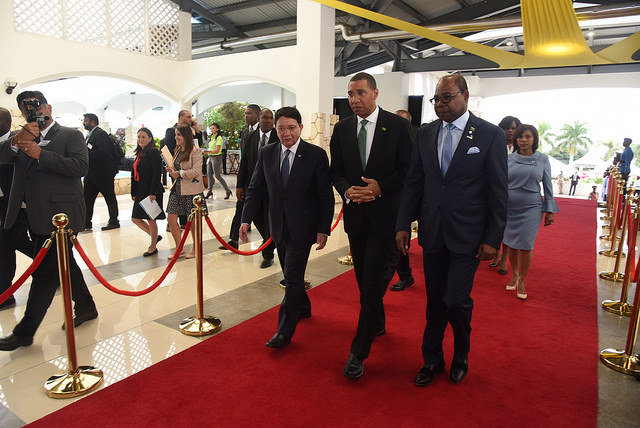
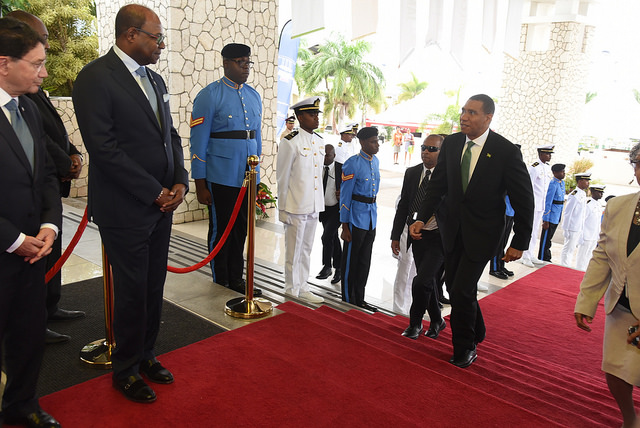
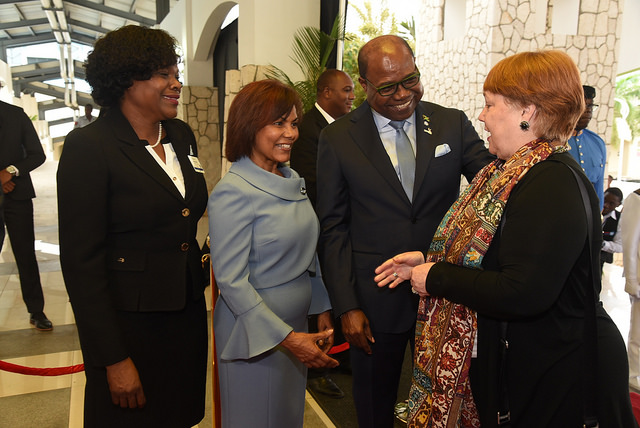
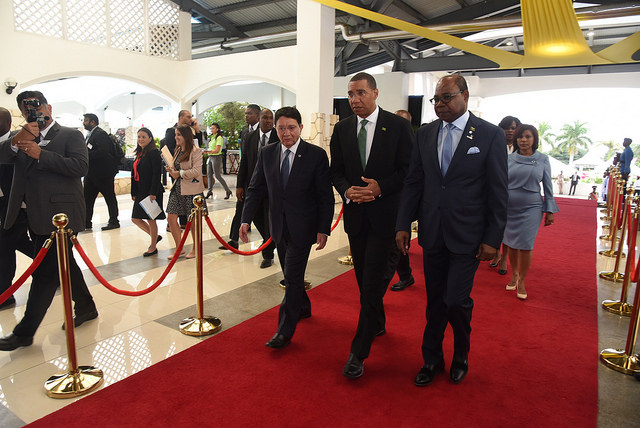
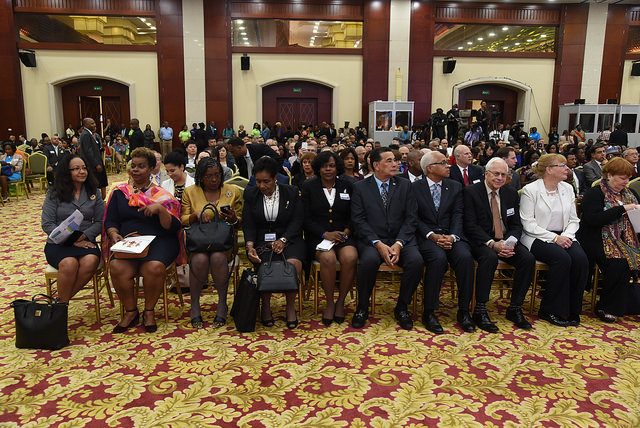
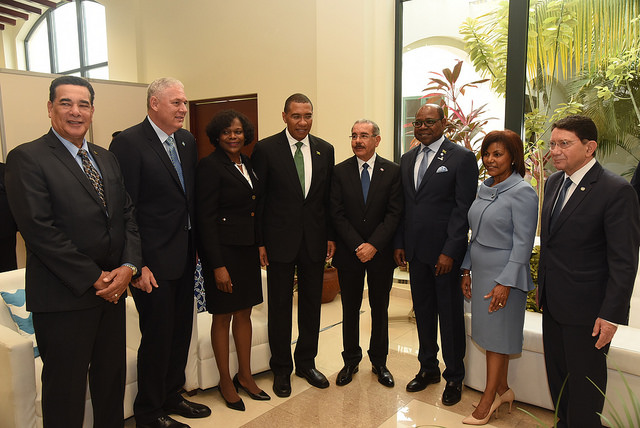
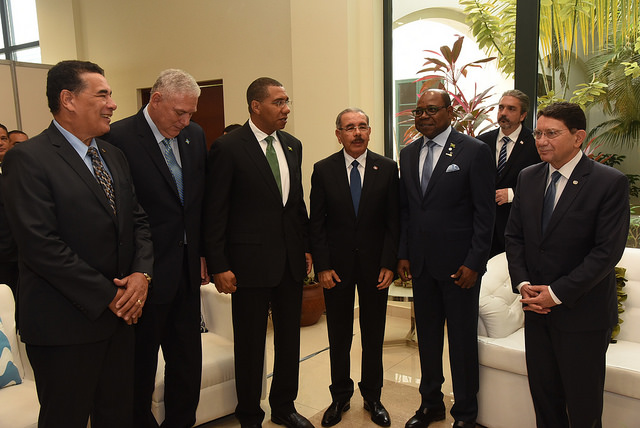


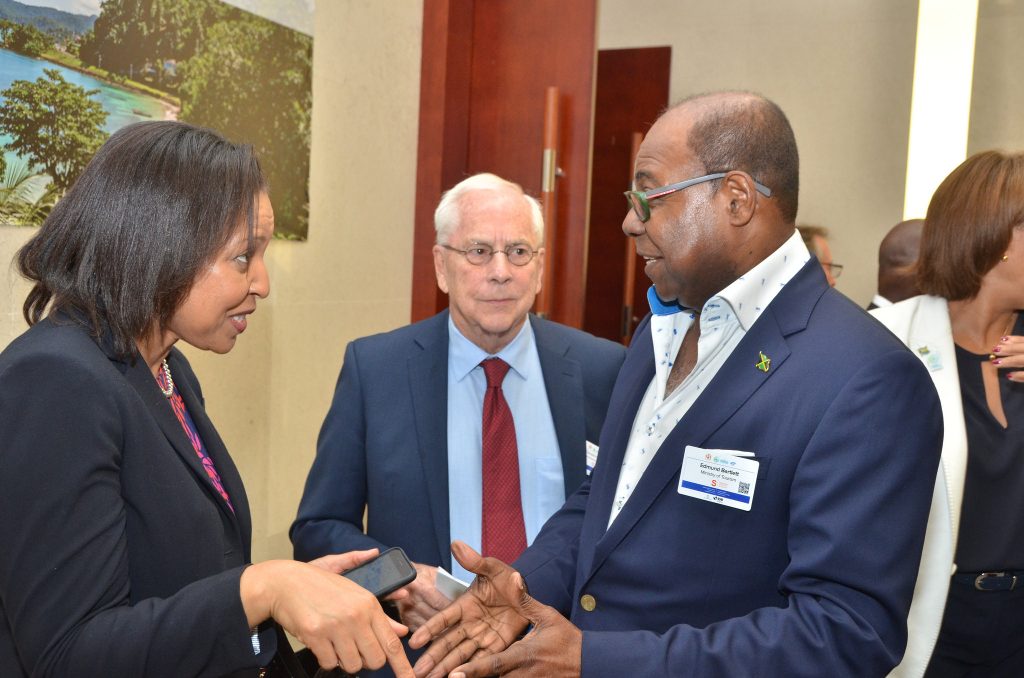
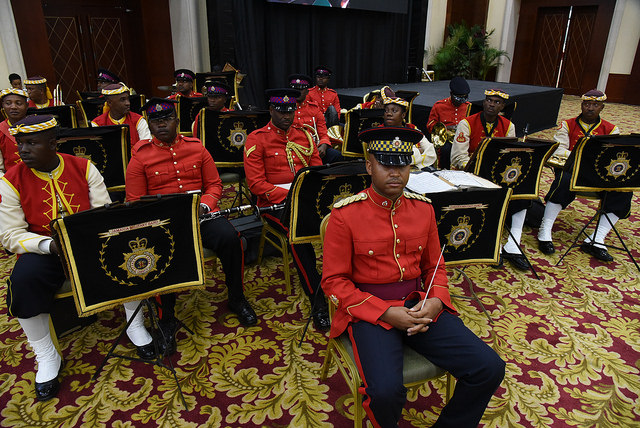
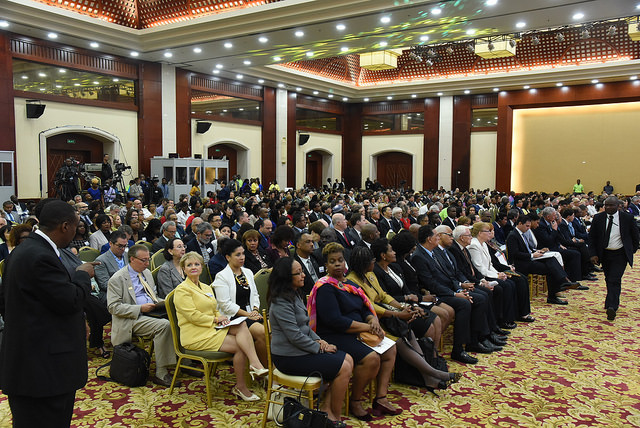
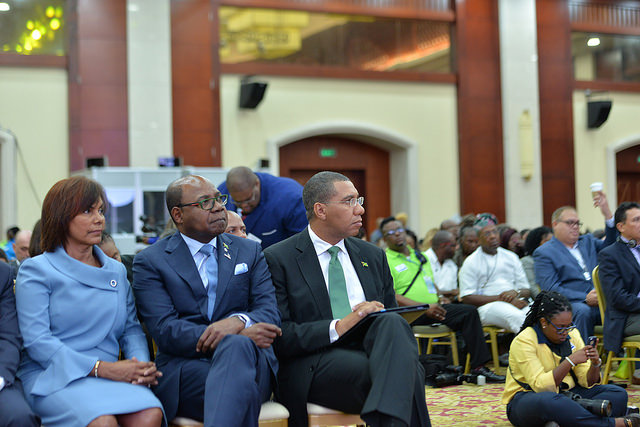
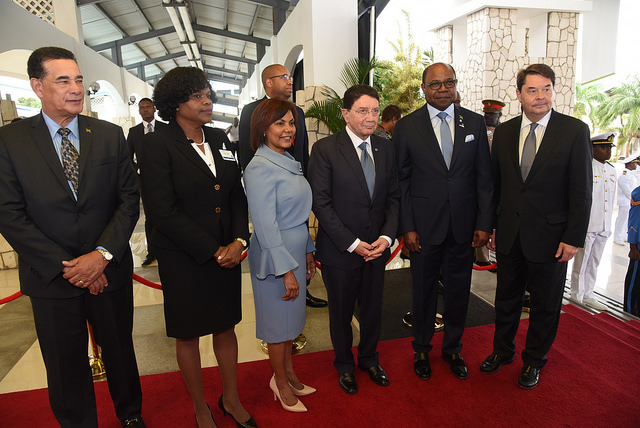
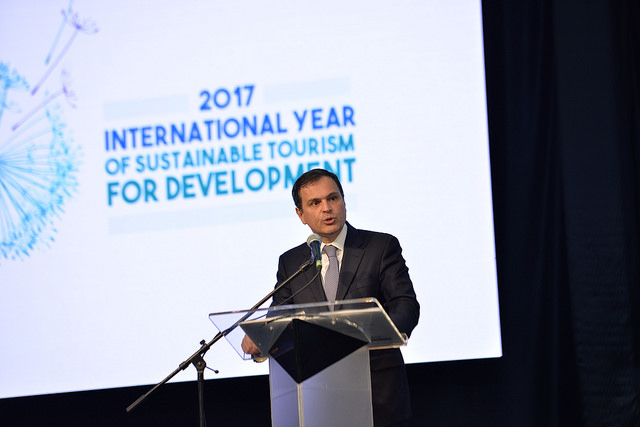
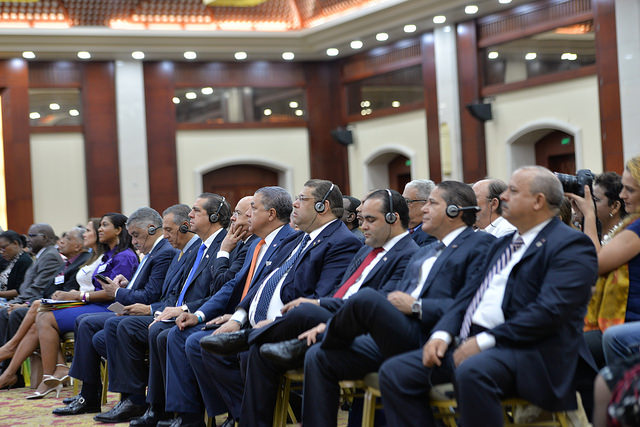

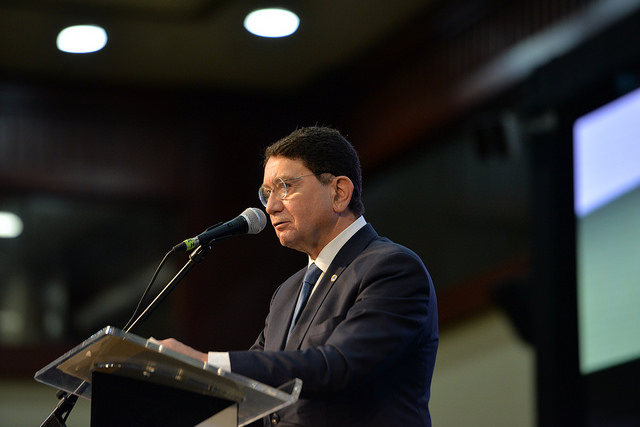
UNWTO Secretary General Taleb Rifai makes Jamaica proud
UNWTO Secretary General, Taleb Rifai told the packed audience that he felt the pride Jamaicans had for their beautiful country, when he heard the presentation of the national anthem this morning, before delivering the following remarks at the opening ceremony of the Global Conference on Jobs and Inclusive Growth: Partnerships for Sustainable Tourism:
Prime Minister, Minister Bartlett, Luis Almagro Secretary General, OAS
Dear Friends,
Good morning and welcome to our very first Global Conference on Jobs and Inclusive Growth in Tourism.
It is a pleasure to be here and to have Jamaica as our generous host, a country that has long been an important partner to UNWTO and the global tourism and development communities.
Particular thanks to the Special Ambassadors of the International Year of Sustainable Tourism for Development 2017, Dr. Michael Frenzel is here today representing them, to all our official sponsors and partners, namely those who join us today, All Nippon Airways, Hilton, PR MediaCo, Ras Al Khaimah, and the Government of Colombia (thank you for coming Sandra).
All of you have made this year possible.
Allow me also to thank the World Bank and the Inter-American Development Bank for partnering with UNWTO and Jamaica in organizing this Conference as well as Chemonics, WTTC, the George Washington University, the Caribbean Tourism Organization and Caribbean Hotel and Tourism Association for their great support to the Conference.
Dear Friends
At the outset of our gathering allow me to express our deepest and most sincere support to all the countries in this region affected by the devastating hurricane Irma.
We are here to show you our full support and walk with you through recovery.
Dear Friends,
Against all odds and despite all challenges, travel and tourism continues to grow as one of the leading socio-economic sectors in the world today.
In 2016, 1235 million travelers crossed international borders, in one year.
That is almost 1/6 of the people of the world making an international trip every year.
2016 was the seventh consecutive year in a row of above average economic growth.
This year, 2017, is no different, as global growth between January and August continues even stronger at +7%.
Tourism is:
Generating US$3.2 billion of spending every day globally
Creating 1/10 jobs all over the world
Representing 10% of world GDP
Constituting 30% of world trade in services,
Travel and tourism is today the 3rd largest export industry in the world after chemicals and fuels.
UNWTO’s long-term forecasts show that by 2030, the 1.2 billion of today will be 1.8 billion.
Beyond the numbers and the economic benefits, tourism is today bringing us together like never before.
Together with other forces of globalization, travel and tourism is making the new world smaller, more connected and more informed, and therefore, more involved, more concerned and a more caring world, a better world indeed.
Travel and tourism is today contributing to breaking down barriers and stereotypes, enabling us to experience, enjoy and celebrate the beauty of our rich cultural diversity.
Mark Twain summed it up pretty well when he said “travel is fatal to prejudice, bigotry, and narrow-mindedness, and many of our people need it sorely on these accounts.”
Travel, dear friends, opens minds, opens eyes and opens hearts.
We become better people when we travel.
Dear Friends,
With growth, however, comes power, and, with power, comes responsibility – with 1.8 billion travelers, we could end up with 1.8 billion opportunities, or 1.8 billion disasters – it’s all up to us.
How we manage this impressive growth is in our hands.
We need to ensure that the 1.8 billion travelers, can and should, when well-managed, translate into:
Opportunities for inclusive economic growth
Opportunities for more and better jobs, decent jobs
Opportunities to distribute wealth and share prosperity
Opportunities to better know and respect each other
Opportunities to protect our natural and cultural heritage
In short, growth, inclusion and progress are our means to achieve
sustainable development.
Because sustainability, my friends, is to sustain LIFE on earth.
Not just to preserve its natural and cultural assets and the foundations of who we are, where we live,
and, how we live (in today’s context, how and where we work) but, to do so, and in the process, elevate LIFE on earth to a higher level of progress and quality for all the people.
BECAUSE
It’s really all about people – they are at the center of all challenges
Growth and sustainability,
Progress and sustainability, should go hand in hand, not either – or, but a win-win equation.
Dear Friends,
In 2015, the international community accomplished three important milestones,
– The 17 SDGs, a roadmap to 2030 (UNGA)
– The Paris agreement on climate change (UNFCCC)
– Dedicate 2017 as “The international year of sustainable tourism for development” (UNGA)
2017 is, therefore, a very special year for us, in the travel and tourism industry, and a unique opportunity for all of us to come together to promote the contributions of travel and tourism, as a grand 21 c human activity, to shape a better future for people and planet.
The question today remains, how can we use this unique opportunity of the IY 2017, to ignite and enable this transformative force, called Travel & Tourism, to contribute to all 17 SDGs, our agenda for 2030? To contribute to making this world a better place?
Dear friends,
I am certain that part of the answer lies in strong, effective and transparent partnerships.
In today’s globalized world, every challenge is a global challenge.
Strong collaboration and decisive action is required to surmount these global challenges.
And such a global challenge, as ensuring sustainable growth for years to come, calls for common goals – effective global partnerships, and stronger financing for development with means which reflect the real potential of tourism to make this world a better place.
That is the message that we are giving loud and clear this week.
Dear Friends,
This conference is a unique opportunity to deliver on a new framework for global partnership for sustainable development through tourism.
An opportunity to create a new roadmap to make tourism an effective path to a better future for all people, leaving no one behind.
As we do so, lets us always remember our motto for this year
TRAVEL
ENJOY
RESPECT (RESPECT NATURE; CULTURE AND THE OTHER)
Thank you.
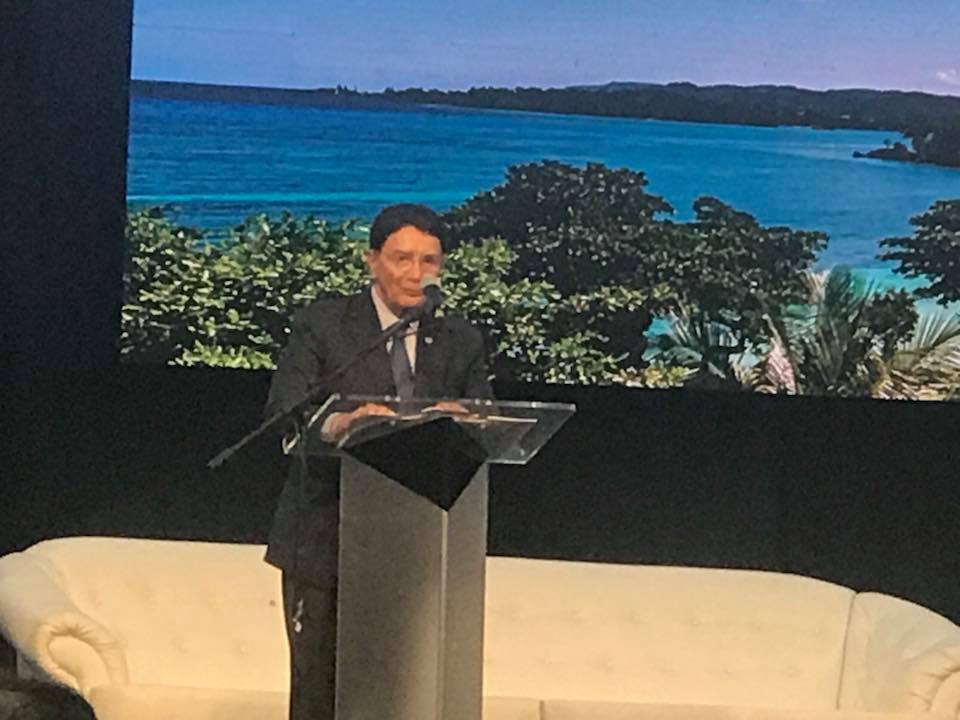
UNWTO Secretary General Taleb Rifai has a message for Caribbean Tourism Stakeholders
The UNWTO conference on jobs & inclusive growth at the Montego Bay Convention Center in Jamaica has been going overtime today. Among the many celebrities speaking Monday afternoon was outgoing UNWTO Secretary General Dr. Taleb Rifai explaining tourism resilience. The UNWTO Secretary-General said travel and tourism are bringing us together and it makes it a better world.
He announced establishing a global crisis network center in the Caribbean to respond to any crisis anywhere in the world. Tourism should take a leading place in crisis management.
This was echoed and confirmed by Jamaica’s Minister of Tourism, the proud host of this conference.
This special session on building resilience in the face of natural disasters in both a humanitarian and economic necessity, especially for regions like the Caribbean where tourism is often the major source of income and fuels the islands economies and societies. Therefore it is essential for the region to have a functioning crisis preparation management and recovery process that involves both the private and the public sectors. According to Rifai, effective media outreach is utmost important, and it cannot be just statements from the minister saying how good everything is.
Rifai endorsing Jamaica’s minister’s brainchild of opening a crisis resilient center in the Caribbean that would take charge of any disaster anywhere in the world was received by applause.




 The roundtable included Luis Almagro, Secretary General OAS, Edmund Bartlett, Minister of Tourism, Jamaica, Cardigan Conner, parliamentary secretary for tourism, Anguilla, Hugh Rile, Secretary General and CEO, CTO, Frank Comio, CEO and Director General Caribbean Hotel and Tourism Association, Kim Hurtault- Osborne, Executive Secretary for Integral Development, OAS, Virginia Messina, Director Caribbean Recovery Taskforce, WTTC, Sandra Carvao, Chief Communication and Publications Officer, UNWTO, Abel Matutes, Director Palladium Hotel Group, and Prof. Geoffrey Lipman, co-founder Sun X and president International Coalition of Tourism Partners (ICTP).
The roundtable included Luis Almagro, Secretary General OAS, Edmund Bartlett, Minister of Tourism, Jamaica, Cardigan Conner, parliamentary secretary for tourism, Anguilla, Hugh Rile, Secretary General and CEO, CTO, Frank Comio, CEO and Director General Caribbean Hotel and Tourism Association, Kim Hurtault- Osborne, Executive Secretary for Integral Development, OAS, Virginia Messina, Director Caribbean Recovery Taskforce, WTTC, Sandra Carvao, Chief Communication and Publications Officer, UNWTO, Abel Matutes, Director Palladium Hotel Group, and Prof. Geoffrey Lipman, co-founder Sun X and president International Coalition of Tourism Partners (ICTP).
Lipman said to bank on our children and grandchildren and explained his resilience education and the Maurice Strong Legacy Scholarships.
After the session, Xu Jing, UNWTO’s Regional director for Asia and Pacific explained the potential of Chinese Tourists also for the Caribbean. Cuba had a visa-free policy with China sometimes, and already welcomes 49,000 tourists a year. Jamaica also has a visa-free arrangement with China and almost 5,000 Chinese visitors stayed in Jamaica. There is a lot of room for expansion looking at the arrival numbers going into the millions the United States enjoys.
This interesting and well-received session was moderated by Carlos Vogeler, Executive Director, UNWO.
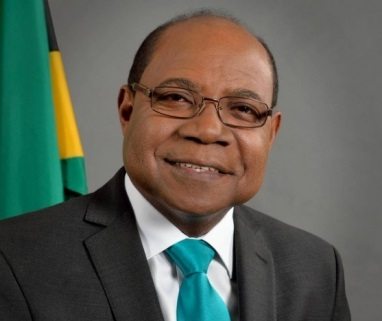
Jamaica’s Tourism Minister delivers address at UNWTO conference opening
Jamaica’s Minister of Tourism, Edmund Bartlett delivered the following address at the opening of the UNWTO Global Conference on Sustainable Tourism at Montego Bay Convention Center on November 27, 2017:
• It is indeed a great honor and tremendous privilege to be opening this very monumental UNWTO international tourism conference, which is the first of its kind in the Caribbean.
• Billed – “Building Private-Public Partnerships for Sustainable Tourism for Development – this conference welcomes global policymakers and leaders in tourism from over 157 countries, several international agencies of the United Nations as well as large delegation of local stakeholders to the beautiful city of Montego Bay for three days of fruitful engagement and discussion about the future of global tourism.
• Over the next three days a wide range of issues related to the resilience and sustainability of global tourism will discussed, such as:
o public-private collaborations for tourism development and growth;
o key elements of successful investments in the tourism sector;
o international best practices in tourism development;
o tourism and the SDGs;
o international technical assistance and financing for tourism development projects; and
o Donor-funded projects that balance scale, sustainability and inclusion.
• At the end of this conference, I am very optimistic that we will be able to craft a global agenda that seeks to design collaborative approaches to mitigate shared tourism risks and strengthen resilience as well as build consensus around the strategies necessary to further position global tourism as a catalyst for promoting inclusive economic growth, sustainable livelihoods, environmental sustainability and social development.
• I note that a conference of this nature and magnitude is very fitting and is indeed a timely response to some of the emergent issues that are posing a serious threat to the sustainability of the tourism product in the Caribbean and other tourism-dependent regions across the world.
• The United Nations 70th General Assembly designated 2017 as the International Year of Sustainable Tourism for Development with the hope that this would present a unique opportunity to raise awareness of the contribution of sustainable tourism to development among public and private sector decision-makers and the public, while mobilizing all stakeholders to work together to make tourism a catalyst for positive change.
• The International Year also seeks to support a change in policies, business practices and consumer behavior towards a more sustainable tourism sector that can contribute to the attainment of the Universal 2030 Agenda for Sustainable Development and the Sustainable Development Goals (SDGs). So you can see, this conference fits perfectly within the global focus on sustainable tourism.
THE CARIBBEAN PERSPECTIVE
• The question of sustainability is an even more urgent concern for tourism-dependent small island dependent states, like those in the Caribbean, that face disproportionately greater risks due to their sizes, geographical location and lack of economic diversification.
• The Caribbean remains the most tourism-dependent region in the world. Tourism is the single largest generator of foreign exchange in 16 of the 28 countries in the Caribbean and also the sector receiving the most FDI. The region has a higher proportion of total employment and percentage of GDP derived from tourism than any other region in the world.
• Despite this, however, Caribbean countries face a greater degree of vulnerability to the worst effects of major environment disasters, particularly climate change, a phenomenon to which they have contributed the least.
• Already, this year the resilience of the tourism sector in the region has been tested with the passage of Hurricanes Irma and Maria, which affected 13 of the most tourism-dependent countries in the region including: St. Martin, Anguilla, Dominica, Barbuda, St. Barts, the British Virgin Islands, the US Virgin Islands, Turks & Caicos, the Dominica Republic and Puerto Rico.
• Some territories have suffered almost total devastation or over 90 % damage to their infrastructure from these hurricanes and it will take many years and substantive investments to bounce back.
• However, if there is one thing I know about my Caribbean brothers and sisters, it is that they are very resilient people and the region’s propensity to bounce back from unpredictable events and soar to greater heights has been tried tested and proven. Importantly despite the challenges, I am happy to report that the Caribbean is still open for business.
YEAR IN TOURISM
• Despite the multi-faceted challenges confronting the region, Caribbean tourism continues to grow at record pace. The tourism sector in the region was able to overcome early projections of downturn in global tourism receipts for 2016 – amid volatility and uncertainty in main source markets such as the USA and parts of Europe owing to Brexit, the US Presidential Elections, and terror attacks in Brussels and in other European cities – to grow at an unprecedented rate of 4.2% in 2016.
• The region welcomed a historic 29 million visitors in 2016, over 1 million more visitors than in 2015. Tourism growth in the region outpaced the global average of 3.9 %. The data for 2016 also indicate that cruise tourism in the region is booming as cruise passenger arrivals grew by an estimated 1.3 per cent, to approximately 26.3 million in 2016.
• For the first six months of 2017, data compiled by the Caribbean Tourism Organization show that the region welcomed 16.6 million international tourists or 800,000 more than in the first six months of 2016, constituting a growth rate of 5.2 %.
• So far, Jamaica’s tourism performance for 2017 has been no less impressive than that of the wider region. We are already on track to surpass last year’s historic growth rate of 4 % or 3.84 million visitors in total. We welcomed over 3.3 million visitors in the first 9 months of 2017 and we expect total arrivals to surpass 4 million by the first week of December.
• Gross foreign exchange earnings for the first 10 months of the year were US$2.34 billion, which is a 10.8 per cent increase over the corresponding period in 2016.
• We remain firmly committed and convicted that our tourism industry is on the right track and that we will achieve our growth target of “5 in 5” or 5 percent annual growth rate in five years.
RISKS AND CHALLENGES IN THE CARIBBEAN
• Although the Caribbean is open for business it cannot be business as usual in the Caribbean. While the tourism sector in the region has traditionally been very resilient and remains one of the most valuable contributors to job creation, poverty alleviation, investments, export revenues, GDP and to the economic livelihoods of millions of citizens , its gentle balance can be easily disturbed by a wide range of risks and threats. These include, global economic recessions, global food shortages, an oil crisis, political instability in major source markets, terrorist attacks, environmental disasters and pandemics and epidemics, just to name a few.
• As we have seen recently with the passage of Hurricanes Irma and Maria, it just takes one powerful disaster to devastate whole national economies. Thus, we can never become complacent.
• We have to reassess our existing strategies for managing risks and challenges, incorporate new approaches and harness new opportunities for growth and expansion in our tourism sector.
• Indeed, the sustainability and resilience of our tourism sector is hinged upon us being forward-thinking, proactive, collaborative, multi-faceted and innovative in our approaches to tourism development in the region.
• I will thus use the next several minutes to discuss some of the priority areas that must be attended to if the Caribbean region is to seriously pursue sustainable tourism in the coming years.
FIVE PILLARS OF GROWTH
• Here in Jamaica , my ministry has already established its “Five Pillars of Growth”, which encompasses five critical areas that we will be prioritizing over the next several years to expand the capacity of tourism to contribute to sustain economic growth, sustainable livelihoods and human development in Jamaica.
These areas are:
o Identifying new markets;
o Offering new products;
o Seeking new investments;
o Forging new partnerships; and,
o The renewal of human capital.
INCLUSIVE GROWTH
• The growth agenda for the Caribbean tourism sector must be people-centered and aligned with broader national economic and social imperatives. It is important that Caribbean states understand that sustainable tourism must mean inclusive growth that will expand economic benefits to local populations; in the process helping to move people’s lives from poverty to prosperity.
• The tourism sector must not only generate prosperity and wealth for large hotel owners and service providers but will also help to preserve the natural and cultural resources of the islands; strengthen linkages with other sectors of the economy, particularly the agricultural and manufacturing sectors; strengthen the benefits derived from the industry by local residents and communities; and promote broader participation by all Caribbean nationals.
COMMUNITY TOURISM
• Caribbean governments are encouraged to make community tourism a priority area of sustainable tourism. Jamaica’s National Community Tourism Policy and Strategy, for example, envisions an invigorated tourism sector in communities that enriches quality of life through social, cultural, economic and environmental benefits, exemplifies sustainable livelihoods, and strengthens Jamaica’s national policy values and interests. Our community tourism initiatives aim to ensure that tourism enterprises return economic, cultural, social and environment benefits to the communities in which they operate.
• Those of you attending Thursday’s three technical tours will get to experience first-hand some of Jamaica’s inclusive community tourism attractions – the Rasta Indigenous Village, Cockpit Country Adventure Tours and Bunkers Hill Cultural X-perience & River Tour.
TOURISM LINKAGES NETWORK
• We have also established our Tourism Linkages Network, which has a mandate of promoting sustainable tourism development in Jamaica by developing and strengthening sustainable linkages between the tourism sector and other productive sectors of the economy — such as agriculture, manufacturing and the creative industries, including entertainment.
• Our Tourism Linkages Council is made up of public and private sector partners who oversee the coordination and implementation of effective and sustainable strategies, which strengthen and facilitate linkages.
SEGMENTATION & DIVERSIFICATION
• If Caribbean tourism intends to be globally competitive we must find ways to unlock new sources of competitiveness. One approach would be to diversify our offerings to attract new markets. International travellers have become far more demanding and have higher expectations of the destinations to which they travel or intend to travel.
• International tourism trends are showing a shift from the traditional ‘sun, sea and sand’ towards interactive experiential tourism, one of tourism’s fastest growing sub-sectors, appealing to markets interested in gastronomy, nature, heritage and cultural experiences in the destinations they choose. The Caribbean tourism sector must position itself to tap into these emergent markets that constitute the future of global tourism
• Here in Jamaica we have already recognized the potential benefits that market segmentation and diversification can produce for the global competiveness of our tourism sector. We have already started to explore five emerging tourism models. These are:
o Gastronomy
o Health and Wellness
o Sports & Entertainment
o Shopping
o Knowledge
NEW MARKETS
• Other means of enhancing the competitiveness of the region’s tourism sector would be for us to enter into discussions with several airlines and tour companies to discuss the way forward in terms of possibly introducing new locations to their Caribbean itineraries.
• We must also aggressively target promising markets in South America, Europe, Asia and even promote more seriously the idea of intra-regional tourism. We must also target our vibrant Caribbean Diasporas that are spread across major source markets such as Canada, the USA and the United Kingdom to encourage expatriates to return home more often.
MULTI-DESTINATION TOURISM
• It has already been recognized that the future fortunes of Caribbean tourism may lie in economic convergence between complimentary economies. Considering this fact, we need to look into the feasibility of multi-destination arrangements that that will increase intra-regional tourist flows and promote mutual benefits for more destinations in the region.
• The countries of the north-western and south-eastern Caribbean are well positioned to embrace this new architecture as their geographic alignments are clear and are all within an hour-and-a-half by air or sea from each other, making it easy for island-hopping and experiential enrichment for the visitor.
• In establishing multi-destination critical mass will be created for large investments in hotels, infrastructure, agriculture and manufacturing. Furthermore, small and medium-sized businesses will enter the market providing more goods and services, employing more people and provide value added goods and services to the economy. This will be a win-win for all.
• For our part we continue to aggressively pursuing a multi-destination marketing arrangement with Cuba, Mexico and the Dominican Republic.
• As we explore opportunities in multi-destination tourism, we must also seek regional cooperation in related areas such as aviation and airlift strategies to move seamlessly within the region, visa facilitation and access to each other’s destinations, as well as pre-clearance arrangements.
• This also has significant implications for marketing, which could help position the Caribbean as a powerful holiday destination.
WORKFORCE DEVELOPMENT
• Moving forward we must also recognize the importance of workforce development in the tourism sector.
• Tourism remains one of the country’s most labour intensive sectors and capacity-building and the welfare of tourism workers is critical to the region’s ability to promote sustainable tourism development.
• We must commit ourselves to the constant training and retraining of our tourism workers; to engendering collegial relationships between staff and management and to providing for the welfare development of tourism workers through initiatives aimed at ensuring they have access to scholarships, internships, insurance coverage and home-owning opportunities.
• This is important in ensuring that they are able to continue to deliver quality service, which is the hallmark of any globally-competitive tourism product. To promote workforce development, my ministry has already established A Pension Scheme for Tourism Workers and we intend to develop solutions that will allow hotel workers to access affording housing opportunities.
SUPPORT FOR MICRO, SMALL AND MEDIUM-SIZED ENTERPRISES.
• The overwhelming success of region’s tourism product has largely been as a result of the synergies and symbiotic relationships that have traditionally existed between the hotels and other linked sectors and enterprises, which have all played a major role in guaranteeing the totality of the local tourist experience.
• Indeed, tourism is nothing without the vast network of micro, small and medium-sized tourism enterprises (MSMTEs) that contribute significantly to the authenticity and quality of the tourism experience; enhance destination competitiveness, contribute to enhanced brand image and that help to forge positive local networks and enhance productivity. We must continue to protect and deepen these synergies to ensure that more local businesses can continue to benefit from tourism.
• We must reaffirm our commitment to supporting initiatives that will help to showcase the talent, products and services of our local producers as well as provide training and assistance in areas such as provision of training and technical assistance in areas such as: marketing, business administration, product development, skills development and ICT use for artisans and community-based enterprises.
E-TOURISM
• On the supply side, we must keep abreast with the current digital trends. We must recognize that ICTs have tremendous potential to enhance competitiveness, strengthen our tourism brand and grow our market shares. As such it is in our best interest to promote ICT diffusion in the tourism sector. The survival of our tourism sector may very well depend on it.
• The Travel & Tourism Competitiveness Index (TTCI) 2015, which measures the set of factors and policies that enable the sustainable development of the Travel & Tourism sector, concludes that countries performing more strongly on the TTCI are those that are better prepared to capture the opportunities of new trends: the differing preferences of a new generation of younger travelers; and the growing importance of online services and marketing, especially through mobile internet.
• Tourism is an information intensive sector and ICT’s are a key driver for developing countries in organizing and marketing their tourism products.
• Adopting ICT innovations will help to mitigate tourism leakage by ensuring that local businesses, operators and purveyors of tourism products and services are better able to enhance their own capacities to create new knowledge and information-intensive businesses and thus seize commercial opportunities that are usually outsourced to foreign markets, depriving the Caribbean countries of valuable earnings.
• Tourism players who understand the potential of knowledge and Information innovations to not only deliver more premium tourism products and services but to also better market their own businesses will outcome those who continue tom rely on traditional modalities.
• We must be taken off guard here in the region. Before it is too late, we must recognize that the future of tourism-related data collection and management, planning, marketing, mapping, exchanges and transactions, market analysis, product development, diversification and value-added services is linked to the adoption and exploitation of ICT capabilities such as big data, big data analytical, machine learning, blockchain technologies, The Internet of Things and robotic).
• We must begin to manipulate these ICTs platforms to reinforce the resilience of our tourism product.
SMART TOURISM/SMART DESTINATIONS
• ICT diffusion in the tourism sector is also aligned with promoting smart tourism destinations which can be defined as those destinations that exploit real-time data, integrate and share data, and using complex analytics, modeling, optimization and visualization to make better operational decisions.
• Smart tourist destinations will also use technologies (such as sensors and other IOT platforms) innovatively to achieve improved security and traffic monitoring, resource optimization, participatory governance, sustainability and improved quality of life.
DISASTER RISK MANAGEMENT/ CRISIS MANAGEMENT
• Unfortunately, none of the initiatives that I have just described will be able to realize their transformational effects if the region does not address its most pressing and immediate threats to sustainable tourism development.
• More than any other time in our past, tourism authorities in the region must now seriously address the issue of disaster risk management and mitigation. It is clear that in recent years the region’s tourism sector has become increasingly vulnerable to both natural disasters and external shocks, particularly climate change, which can now be reasonably described as an existential threat to our tourism sector.
• The time has come for us to urgently respond to and strengthen our resilience against threats such as natural disasters, climate change, pandemics and epidemics, terrorism, cyber attacks. We need to enhance our regional capacity to manage range of chronic transnational challenges that can be destabilizing to our tourism sectors.
• Aspects of this approach could involve developing a framework of indicators to measure resilience; promoting innovation systems for climate adaptation and resilience; fostering deepened knowledge of cyberspace policy, promoting counter-terrorism studies, developing urban resilience and building meaningful partnerships.
• Meaningful risk management strategies for the region must focus on priority areas and outcomes such as Collaborations, information-sharing, collective action, capacity-building, resource allocation and funding, public education, planning and management of projects, behavioral modifications, monitoring and evaluation, environmental conservation, alternative and renewable energy and the adoption of green practices in the tourism sector.
CLOSING REMARKS
• In closing, as I open this very important conference which joins key tourism principals from all across the world together, the message is SUSTAINABILITY and we must use this opportunity to push a global sustainability agenda that will ensure the survival and resilience of the tourism sector upon which billions of people across the world depend on, directly and indirectly, for their sustenance and livelihoods.
• In addressing shared risks and threats, insularity and narrow-self interest must be replaced by fruitful engagements and collaborations which seek to develop cross-cutting solutions and unite tourism players under a common mission, which is to save a sector that is so dear to all of us.
Thank you.
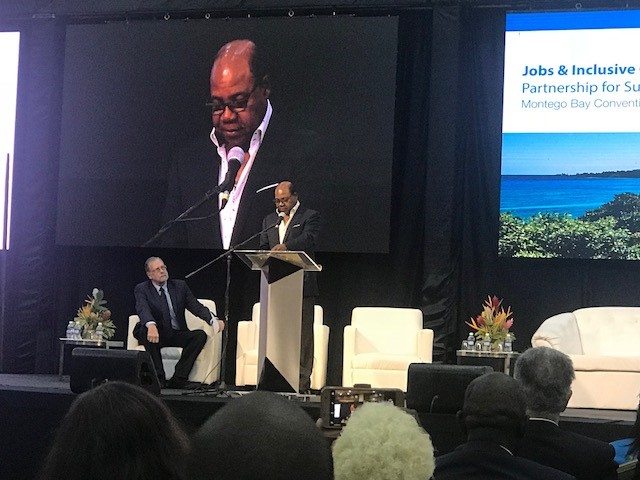
Jamaica UNWTO conference: The future of tourism in the Caribbean
Partnership for sustainable tourism started today at the UNWTO conference on jobs & inclusive growth in Montego Bay Convention Center.
A proud host the Jamaica minister of Tourism HE Edward Bartlett welcomed 1300 delegates from well over 60 countries to the largest tourism conference ever held in Jamaica. He said it’s actually the largest conference of this sort ever held in the world.
The subject this morning was the future of tourism in the Caribbean touching public private partnerships.
Keynote for The Future of Tourism – Innovation Challenges in the Caribbean Region was delivered by Eduardo Fayos-Solá, Senior Adviser, IITS George Washington University.
Overview session was moderated by Lloyd Waller, Senior Advisor to the Minister of Tourism, Ministry of Tourism, Jamaica.
The session’s panel members were:
• Dionisio D’Aguliar, Minister of Tourism and Aviation for the Bahamas and Chairman, CTO
• Karolin Troubetzkoy, President, CHTA
• Kim Hurtault-Osborne, Executive Secretary for Integral Development, OAS
• Virginia Messina, Director, Caribbean Recovery Taskforce, WTTC
• Carlos Vogeler, Executive Director, UNWTO
• Abel Matutes, Director General, Palladium Hotel Group
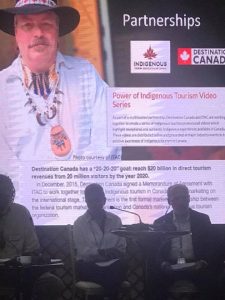


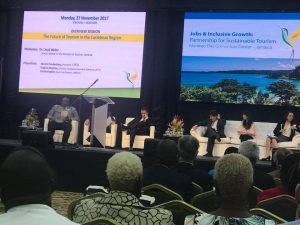
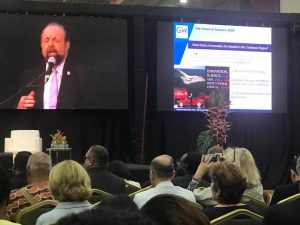
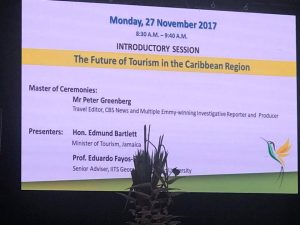

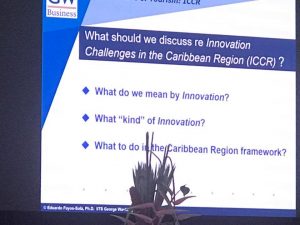
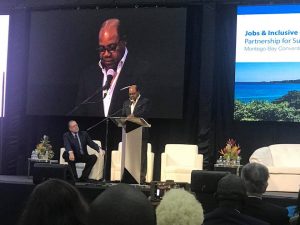

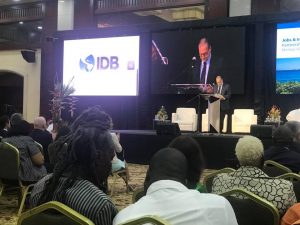
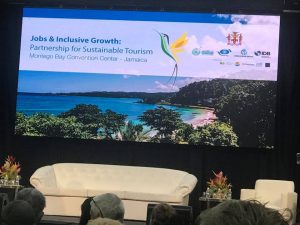

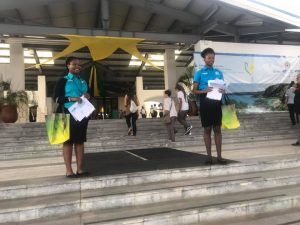
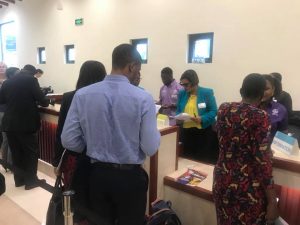


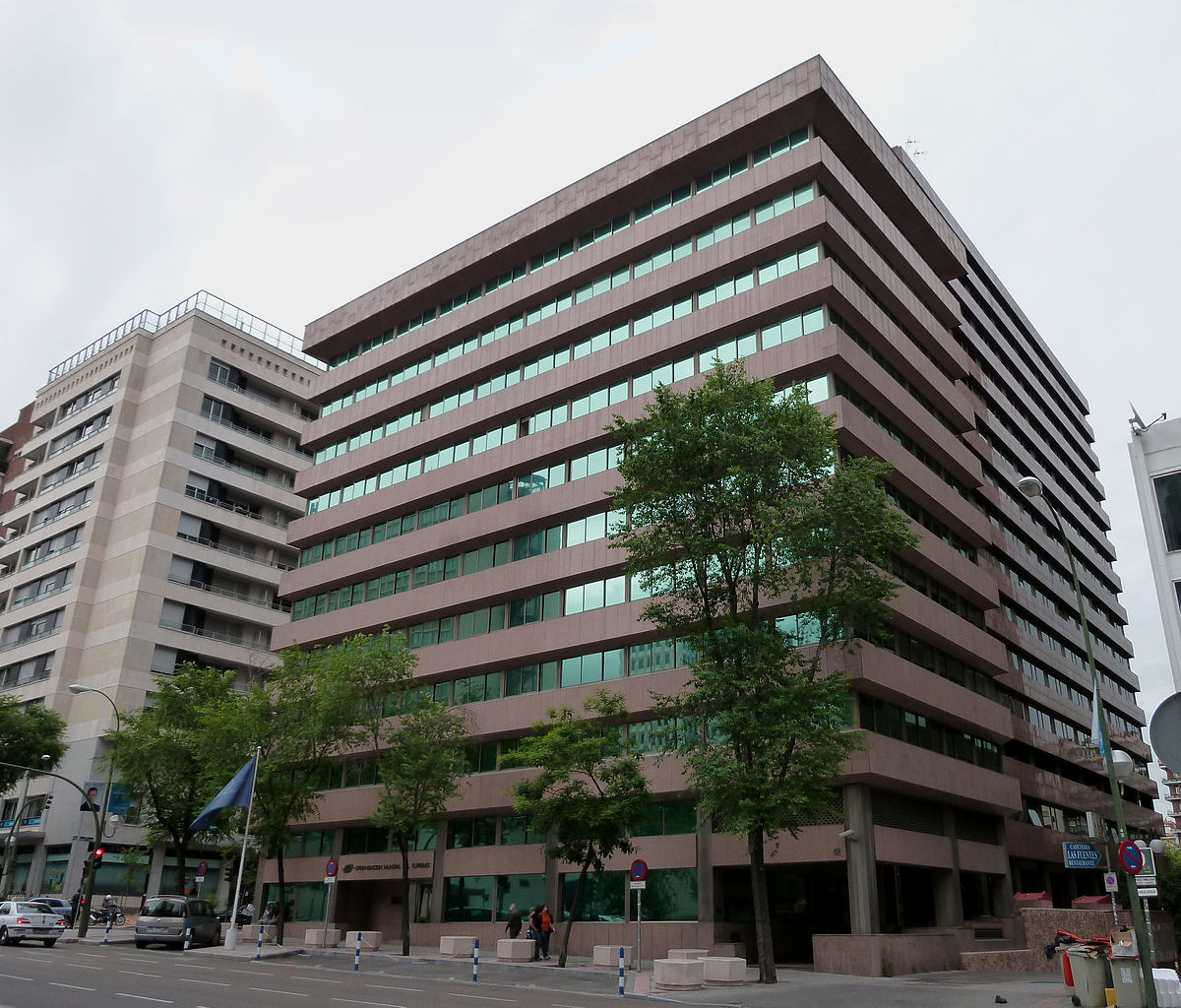
UNWTO announces the winners and finalists of the UNWTO Awards
The World Tourism Organization (UNWTO) announces the winners of the UNWTO Ulysses Prize and the UNWTO Ethics Award, as well as 14 finalists for the upcoming 14th Edition of the UNWTO Awards for Innovation in Tourism. The Awards Ceremony will be held next January 2018 in Madrid on the occasion of the International Tourism Fair, FITUR.
The UNWTO Awards recognize inspirational individuals and projects for their innovative achievement as well as their invaluable dedication to developing and advocating sustainable tourism in line with the UNWTO Global Code of Ethics for Tourism and the Sustainable Development Goals (SDGs).
The 14th Edition of the UNWTO Awards will take place in January 2018, co-hosted by FITUR, the International Tourism Fair in Spain/IFEMA in Madrid, Spain. The Awards Ceremony will be preceded by the UNWTO Awards Forum where finalists will present their respective projects.
The following are the awarded projects and individuals:
UNWTO Ulysses Prize for Excellence in the Creation and Dissemination of Knowledge in Tourism awarded to Valene L Smith.
Valene L. Smith, Professor Emeritus and Research Professor at the California State University, Chico, California, United States of America has been nominated as the 2018 UNWTO Ulysses prize laureate.
Professor Smith is a pioneer in tourism and anthropology, with an extensive number of projects and accomplishments throughout her extensive career. Her classic book, ‘Hosts and Guests’ (University of Pennsylvania Press, 1977), preceded by her 1953 geography courses, marked the start of this connection becoming explored by an army of scholars. She was recognized in 2000 as a Women of the 20th Century, and is a recipient of the US Chamber of Commerce’s Community Service Award. She is also an active member of various associations including the American Anthropological Association, the Society of Woman Geographers, the American Association of University Women and the American Fulbright Association.
UNWTO Ethics Award recognizes Europa Mundo Vacaciones
The Jury of the UNWTO Ethics Award, comprising Members of the World Committee on Tourism Ethics, has selected Europa Mundo Vacaciones as the winner of this second edition of the Award for its initiative “Europa Mundo Foundation”.
Europa Mundo Vacaciones is a Spanish tour operator strongly committed to the principles of environmental and social responsibility and has achieved remarkable results in the implementation of the UNWTO Global Code of Ethics for Tourism, particularly in its contribution to community well-being and sustainable development of tourism.
In 2011 it created a Foundation aimed at conducting social activities and development cooperation in different areas and for specific segments of the population, as well as to promoting sustainable tourism in many countries of Africa, Asia, Europe and Latin America.
The UNWTO Ethics Award was established in 2016 and is open to all companies and associations that are official signatories of the Private Sector Commitment to the UNWTO Global Code of Ethics for Tourism . To be eligible for the Ethics Award, signatories must have reported on its implementation.
14 Project finalists of the UNWTO Awards for Innovation in Tourism
Fourteen innovative projects among 128 applicants from 55 countries have been selected as finalists of the 14th UNWTO Awards for Innovation in Tourism. The winners will be unveiled during the UNWTO Awards Ceremony.
The list provided below is based on the alphabetical order of the country.
UNWTO Award for Innovation in Public Policy and Governance
- MiBarrio – Mercado de Hacienda Applied Research Project, Ente de Turismo del Ministerio de Modernización, Innovación y Tecnología del Ciudad Autónoma de Buenos Aires, Argentina
- Longmen Grottoes “Internet + Longmen” action plan, Management Committee of Longmen Grottoes World Cultural Heritage Park, China
- Tourism training talent (TTT), Turismo de Portugal, Portugal
UNWTO Award for Innovation in Enterprises
- Great Plains Conservation: Conserving and Expanding Natural Habitats, Great Plains Conservation and the Great Plains Conservation Foundation, Botswana and Kenya
- Conservation and Livelihoods: Community managed Ecotourism at Mangalajodi, Mangalajodi Ecotourism Trust, India
- Community and Resilience: two villages tackle depopulation, Valle dei Cavalieri, Italy
- Three-Pillar Innovation Initiative, Balesin Island Club, Philippines
UNWTO Award for Innovation in Non-Governmental Organizations
- Educating and empowering local communities for sustainable tourism futures, The Sumba Hospitality Foundation, Indonesia
- Connecting community, local friends, and visitors to a unique experience and happiness, Triponyu.com, Indonesia
- IT.A.CÀ – Migrants and Travelers, Festival of Responsible Tourism, Associazione YODA, Italy
- Strengthening Community Tourism in the Sierra Gorda, Grupo Ecologico Sierra Gorda, Mexico
UNWTO Award for Innovation in Research and Technology
- EarthCheck Building Planning and Design Standard (BPDS), EarthCheck, Australia
- eVisitor – Croatian national tourist information system, Croatian National Tourism Board, Croatia
- Smart Tourism System (STS), SEGITTUR, Spain
Further information:
- 14th UNWTO Awards Forum, 15 January 2018, Paraninfo, Complutense University of Madrid, Madrid, Spain.
- 14th UNWTO Awards Ceremony, 17 January 2018 at IFEMA, Madrid, Spain.
Useful links:
- 14th UNWTO Awards Events
- Sponsorship opportunities
- Register for the events: the registration will open early December.
- More information on the winners and finalists:
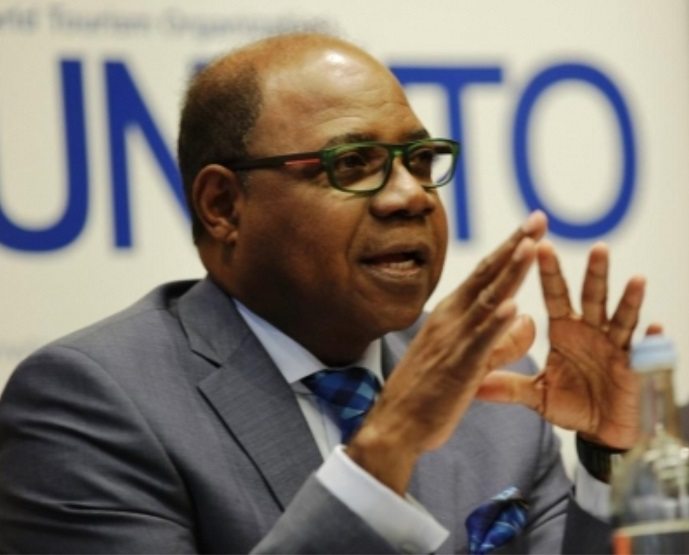
Jamaica is the center of global tourism: Hon. Edmund Bartlett in charge
World Tourism is in Jamaica this week. Two years of planning under the leadership of the Hon. Edmund Bartlett, Minister of Tourism, Jamaica, travel and tourism leaders from around the world are meeting at the Montego Bay Convention Center this week.
The Global Conference on Jobs and Inclusive Growth: Partnerships for Sustainable Tourism has many times the importance it had when the Jamaica minister started planning to bring this event to his country.
Today the Caribbean Tourism industry is in a crisis, and Hon. Edmund Bartlett had emerged as the number one leader in becoming a crisis leader for the good of the region.
The Monday program is as follows:
9:00– 9:10am Introduction of Keynote Speaker
Edmund Bartlett, Minister of Tourism, Jamaica
9:10 – 9:40am Keynote: The Future of Tourism – Innovation Challenges in the Caribbean Region
Eduardo Fayos-Solá, Senior Adviser, IITS George Washington University
9:40 – 10:15am Overview Session – The Future of Tourism
Moderator: Lloyd Waller, Senior Advisor to the Minister of Tourism, Ministry of Tourism, Jamaica
- Dionisio D’Aguliar, Minister of Tourism and Aviation for the Bahamas and Chairman, CTO
- Karolin Troubetzkoy, President, CHTA
- Kim Hurtault-Osborne, Executive Secretary for Integral Development, OAS
- Virginia Messina, Director, Caribbean Recovery Taskforce, WTTC
- Carlos Vogeler, Executive Director, UNWTO
- Abel Matutes, Director General, Palladium Hotel Group
10:30 – 12pm Concurrent Panel Sessions
Session 1: Tourism and Sustainability – Threats, Risks, Opportunities and Challenges
Moderator: David Jessop, Consultant, Caribbean Council
- Seleni Matus, Executive Director, International Institute of Tourism Studies, George Washington University – ‘Report on the Sustainability of Tourism Destinations in Caribbean’
- Jake Kheel, Vice President, Grupo Puntacana Foundation – ‘The Keys to Sustainable Tourism’
- Gaunette Sinclair-Maragh, Associate Professor, University of Technology – ‘Sustainable Development of Protected Areas for Ecotourism: A Case of the Portland Bight, Jamaica’
- Lisa Indar, Head, Regional Tourism and Health Programme, Caribbean Public Health Agency – ‘Improving Safer, Healthier and Sustainable Tourism through the Regional Tourism and Health Programme’
- Martha Honey, Executive Director, Center for Responsible Travel (CREST) – ‘Lessons Learned from 50 Years from Large Scale Cruise Tourism in the Caribbean’
Session 2: Current Trends in Indigenous Tourism
Moderator: Louis D’Amore, Founder and President, International Institute for Peace through Tourism
- Judy Karwacki, President, Small Planet Consulting
- Casey Vanden Heuvel, Chief Operating Officer, Aboriginal Tourism Association of Canada ATAC
- Susan Otuokon, Executive Director – ‘Indigenous Communities (Maroons) in the Blue and John Crow Mountains’
- Edward Wray, Owner, Rastafari Indigenous Village – ‘Inherent Complexities, Conflicts and Confusions in the Concept of indigenous Tourism; Case Study: ‘The Rastafari Village, Montego Bay’
- Clive Muir, Associate Professor, Rusche College of Business, Stephen F. Austin State University – ‘Anancy’s House: Developing a Folklore Centre to Enhance Rural Tourism’
- Jamie Sweeting, President, Planeterra Foundation
Session 3: Talent Development and Human Capital Trends
Moderator: Vincent Vanderpool-Wallace, Former Minister of Tourism for the Bahamas and Former Secretary General of the Caribbean Tourism Organization
- Elizabeth Mackay, MBA BSc., Lecturer, University of the West Indies, Centre for Hotel and Tourism Management, Bahamas; Shaun D. Ingraham, Chief Executive Officer, One Eleuthera Foundation – ‘One Eleuthera Foundation: From Shared Vision to Inclusive Development – Building Partnerships for Sustainable Tourism Development’
- Nigel Cooper, Chairman, College of Business & Management, Consulting Committee and Programme Director, School of Hospitality and Tourism Management, University of Technology – ‘Is the Caribbean Tourism Market Missing out on Pet Tourism?’
- Elecia Myers – ‘Theocentrism and pro-environmental values in the context of tourism in the Caribbean’
- Auliana Poon, Managing Director/ Director, Tourism Intelligence International/ Tourism Intelligence Academy – ‘Innovation and the Future of Caribbean Tourism’
Session 4: Community Tourism
Moderator: Andrew Spencer, Executive Director, Tourism Product Development Co. Ltd
- Olivene Burke, Lecturer, University of the West Indies Mona; Pauline Milwood, Assistant Professor, Penn State University; Tarik Weekes, Research Officer, Institute for Criminal Justice – ‘Sustainability Community Based Tourism: A Fit for Purpose’ Model for Rural and Urban Enterprises’
- Ian Boxil, Dean, Faculty of Social Sciences, University of the West Indies Mona; Deborah Fletcher, Research Associate, Centre for Tourism and Policy Research, University of the West Indies and Majorie Segree, Research Associate, Centre for Tourism and Policy Research, The University of the West Indies – ‘Towards a More Sustainable Tourism in the Historic Town of Falmouth, Jamaica’
- Beverly Stewart, Tourism Specialist, Jamaica Social Investment Fund – Jamaica’s JSIF/World Bank Community Tourism Journey – ‘The Jamaica Social Investment Fund’s Rural Economic Development Initiative (REDI)’
- Hugh Hough, President & Founder, Green Team Global Inc – ‘The Wide-Reaching Benefits from the Growth of Community Tourism’
- Christine Marrett, Senior Programme Officer, Office of the Pro-Vice-Chancellor Global Affairs, University of the West Indies – ‘Reflections on the development of The Treasure Beach Destination Management Organisation (DMO) Limited from a cluster development project’
12:00 – 1:30pm Lunch Break with a Keynote Speech: Outlook for Outbound Chinese Tourism in the Caribbean
Xu Jing, Regional Director for Asia and the Pacific, UNWTO
1:30 – 3:00pm Concurrent Panel Sessions
Session 5: Tourism Networks – Creating Linkages, Reducing Leakages
Moderator: Adam Stewart, CEO, Sandals Resort
- Cary Wallace, CEO, Tourism Enhancement Fund
- Anne Crick, Senior Lecturer, Mona School of Business & Management, University of the West Indies Mona; Janet Crick, M.A, Tour & Creative Experience Director, Jamaica Culinary Tours, Falmouth Jamaica – ‘Challenges & Opportunities in Gastronomy Tourism: Finding the Sweet Spot’
- Carolyn Riley, Head, Tourism Linkages Network. Ministry of Tourism and Jamaro Marville, Research Fellow, Centre for Leadership and Governance, University of the West Indies, Mona – ‘A Practical Guide to creating a Model for Health & Wellness, Gastronomy, Sports & Entertainment, Knowledge as well as Sports & Entertainment Tourism: The Jamaican Case Study’
- Lisa Neirotti, Associate Professor & Director, Sports Management Programs & MTA, George Washington University; Paulton Gordon, Director, Community Service and Development, University of Technology – ‘Strategies to Optimize Sports Tourism Opportunities for Sustainable Development in the Caribbean’
- Larisa McBean, Graduate Student, University of Birmingham – ‘Sports Tourism as a Vehicle to Sustainable Development: An investigation into the Opportunities and Challenges to the Development of Sports Tourism in Jamaica’
Session 6: Science, Technology, Innovation in Tourism
Moderator: Trevor Forrest, Senior Advisor to the Minister of Science, Energy and Technology
- Simone Harris, Senior Tourism Network Strategist, Tourism Linkages Network, Ministry of Tourism; Lloyd Laing – ‘Prototype for Smart Attractions in Jamaica: Devon House-One of Jamaica’s celebrated Historic Landmarks’
- Caroline Couret, Founder & Director, Creative Tourism Network – ‘The creative tourism as a lever for the territorial development’ (TBC)
- Pauline Milwood, Assistant Professor, Penn State University; Olivene Burke, Executive Director, Mona Social Services, University of the West Indies Mona; Tarik Weekes, Research Officer, Institute for Criminal Justice – ‘Social Innovation & Development of Urban Spaces: In Search of a Model for Sustainable Tourism’
- Ramona Bavassano, Founder, Jammadda Permacultural Ecovillage, International Consultant on Human Sustainable Development – ‘Jamadda Permacultural Park in Treasure Beach Jamaica’
- Shinique Walters, Gender Monitoring and Evaluation Specialist, USAID-CARCEP, ‘Energy conservation in the tourism industry and its impact on sustainable development’
Session 7: Caribbean Tourism within the Context of the Americas
Moderator: Hugh Riley, Secretary General and CEO, CTO
- Allan Fyall, Endowed Professor of Tourism Marketing, University of Central Florida; Roberta Atzori, Assistant Professor, Sustainable Hospitality Management, California State University- Monterey Bay – ‘Rising Sea Levels: Time for Proactive Action in Florida and the Caribbean’
- Chloe Helen Bent – Doctoral Researcher, University of Birmingham – ‘The Cultural Heritage Brand of Treasure Beach: How can we address the need for community consultation?’
- Apirada Chinprateep, Assistant Professor, Department of Development Economics, National Institute of Development Administration – ‘Value Creation of Tourism Sector: In the case of 10 ASEAN Economies, applies to Jamaica’
- Andrea Saayman, Professor, School of Economics, North-West University; Melville Saayman, Research Director, Tourism Research in Economic Environs and Society (TREES), North-West University – ‘Scuba Diving and Sustainable Tourism Developed in a less developed country’
3:00 – 3:30pm Coffee Break
3:30 – 6:00pm Special Session on Building Resilience: Supporting Caribbean Tourism to Prepare, Manage and Recover from Crises
Building resilience in the face of natural disasters is both a humanitarian and economic necessity, especially for regions like the Caribbean where tourism is a major source of income and fuels the islands’ economies and societies. Therefore, it is essential for the region to have a functioning crisis preparation, management and recovery process that involves both the public and private sector. This panel will explore potential strategies for the tourism sector in the Caribbean to recover after Hurricane Irma, as well as look toward a long-term plan for future preparation, management and recovery. Furthermore, the importance of the private sector and aid agencies in the recovery process will be discussed, in addition to innovative public-private partnerships (PPPs) essential to building resilience.
Introduction: Taleb Rifai, Secretary General, UNWTO
Moderator: Carlos Vogeler, Executive Director, UNWTO
- Edmund Bartlett, Minister of Tourism, Jamaica
- Sandra Carvao, Chief, Communications and Publications, UNWTO
- Hugh Riley, Secretary General and CEO, CTO
- Virginia Messina, Director, Caribbean Recovery Taskforce, WTTC
- Cardigan Connor, Parliamentary Secretary for Tourism, Anguilla
- Kim Hurtault-Osborne, Executive Secretary for Integral Development, OAS
- Adam Goldstein, Chairman, Florida-Caribbean Cruise Association (FCCA) (TBC)
- Frank Comito, CEO and Director General of the Caribbean Hotel and Tourism Association
- Abel Matutes, Director General, Palladium Hotel Group
Welcome Reception at Montego Bay Convention Centre

Partnerships for Sustainable Tourism
Tomorrow in Montego Bay, Jamaica the UNWTO Summit on Jobs and Inclusive Growth will start. Delegated are arriving today (Sunday) from around the world.
Partnerships for Sustainable Tourism, SUNx Co-founder, Professor Geoffrey Lipman is one of them and will present 3 innovative ways to help Caribbean Tourism respond to the climate led Hurricane disasters.
Lipman said “Planning must now assume repeat threats, with climate change an increasing factor and response preparations a must.” He added “We are entering an age where Impact-Travel ~ measured: green: 2050 proof ~ will be the new norm”
He identified the following innovative concepts from SUNx designed to support climate resilient travel and tourism systems that could be deployed in the Caribbean.
SUNx Exchange a Climate, Learning, Innovation and Resilience strategy system. It is based on a network of cloud connected, solar powered pre-fabricated Centres for local Community focus, managed by bright next generation climate change champions. Shipped in a single container, they can be set up rapidly, without extensive machinery. The proof of concept SUNx Centre is being established in Belgium’s National Park in Q4 2017. A Caribbean Centre could be established in early 2018; and would play an important and strengthening role in advancing climate resilient Impact-Travel in the region. We plan a roll-out of SUNx Centres across UN regions in 2018/19 and Belt and Road states after that. The ultimate target is for at least one SUNx Centre in every country by 2030, geared to the SDG and Paris Accord programs.
SME Fast Funding The first challenge is to rebuild the tourism economy. SME’s employ a vast number of the labour population, and are diverse, spanning many different industries, geographies and financials profiles. They are vital for economic recovery, yet frequently face regulatory or business barriers to funding. Our partner 1st Global Capital has a strong track record in developing innovative products and electronic support systems, to get funds quickly into the hands of merchants, working in close collaboration with Caribbean Governments and Insurance Companies.
Resilience Education – 105 graduate trainees will be enrolled in our Impact-Travel Lifetime Learning System, designed to provide graduate training in climate change response. 5 will receive $3000 Maurice Strong Legacy Scholarships.
The Strong Universal Network SUNx, is a program of the EU based, not for profit Green Growth and Travelism Institute, and a legacy to the late Maurice Strong – sustainable development pioneer. Its goal is to promote Climate Resilient, Impact-Travel with good & bad effects measured and managed coherently: with Green Growth at the core and, 2050-proof in line with the Paris Accords and the W.E.F. 4th Industrial Revolution.
1st Global Capital (1GC) was established in 2014 to respond to this need and fill a void in the market. In 3 years we have grown from a $15 million per annum financier, to one of the larger funders in the industry, currently pacing to finance more than $200 million in 2017.
Geoffrey Lipman is also president of the International Coalition of Tourism Partners (ICTP) Membership is complimentary. ICTP Chairman Juergen Steinmetz is attending the Summit in Jamaica.

ETC and UNWTO discuss transnational themes and routes in Galicia
The European Travel Commission (ETC) and the World Tourism Organization (UNWTO) held an international seminar in Santiago de Compostela to exchange best practices on how to develop and effectively manage transnational tourism themes and routes. The ETC-UNWTO International Seminar on Marketing Transnational Tourism Themes and Routes was hosted by the Xunta de Galicia and Turespaña on 16-17 November 2017 in the emblematic city of Santiago de Compostela, final destination of the thousand-year-old pilgrim route the Way of St. James.
The two-day event provided insights into the development, management and promotion of transnational tourism themes and routes in Europe and worldwide, as well as practical guidance for National Tourism Organization (NTOs), Destination Management Organizations (DMOs) and National Tourism Administrations (NTAs) on how to market and promote destinations through transnational thematic tourism experiences and products.
“Destinations are at their best when they can benefit from shared experiences and best-practice examples” said UNWTO Executive Director Zhu Shanzhong. In this regard, “collaboration and cooperation among all stakeholders involved are vital to ensure the success of transnational initiatives”, he added.
The international seminar drew the participation of European NTOs, DMOs and travel trade entities, as well as representatives from the European Commission (EC), the European Parliament (EP), the United Nations Educational, Scientific and Cultural Organization (UNESCO), the European Tourism Association (ETOA) and the European Institute of Cultural Routes (EICR), among others.
The event was the occasion to launch the new ETC-UNWTO Handbook on Transnational Tourism Themes and Routes, which provides step-by-step guidance on how to achieve successful themed transnational tourism.
“ETC and UNWTO acknowledge the importance of transnational collaboration in tourism as the competition is becoming increasingly regional rather than national. Today, with the launch of the Handbook on Marketing Transnational Tourism Themes and Routes, we seek to support the work of tourism authorities, managers and experts in this direction” said ETC President Peter de Wilde.
“Europe is much more than its main iconic spots and therefore we should develop transnational policies that help us attract visitors to other destinations”, argued Nava Castro, Director of Tourism of Galicia. Castro referred to the Camino de Santiago and its recognition as the First European Cultural Itinerary and its cultural and spiritual dimensions worldwide. As highlighted, the Camino has become an international reference as it has welcome over 300,000 pilgrims on foot, by bicycle or on horseback of up to 179 different nationalities only in 2017. Only 3,000 visitors were doing the Camino three decades ago.
At the closing of the seminar, the President of Galicia Alberto Nuñez Feijóo reiterated the commitment of Galicia to a responsible, sustainable and accessible tourism, in the framework of the International Year of Sustainable Tourism for Development.
